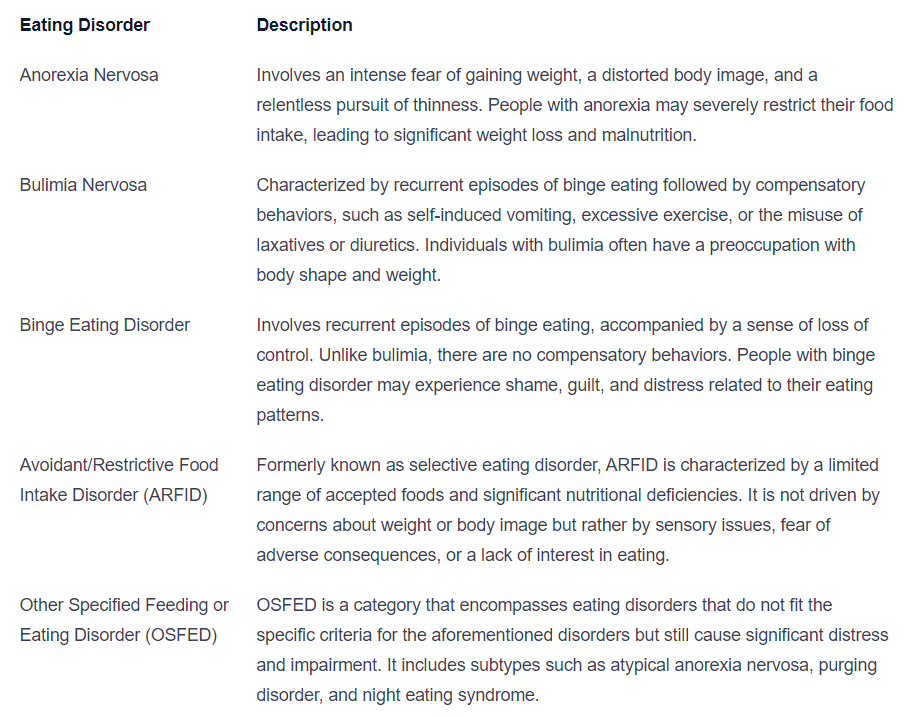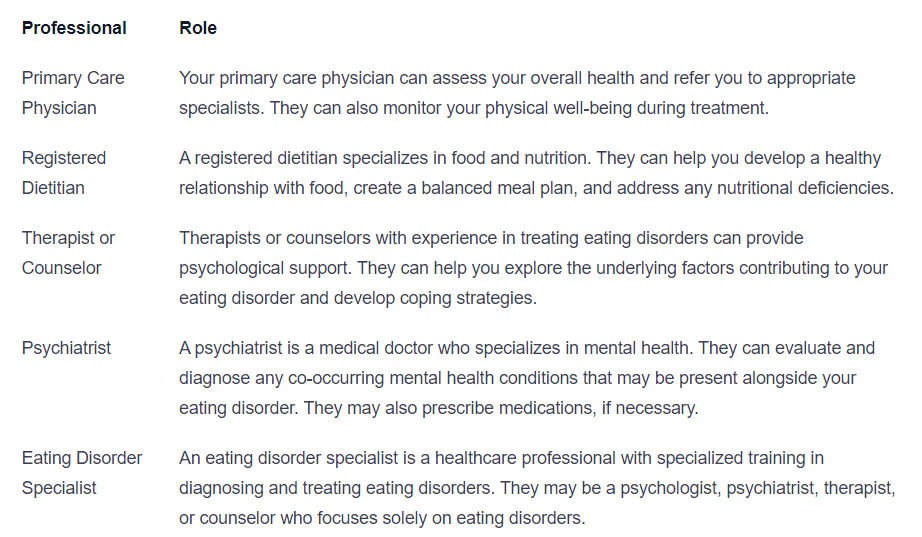Do I have an Eating Disorder?

Understanding Eating Disorders
When it comes to understanding eating disorders, it's important to have a clear grasp of what they are and the different types that exist.
What Are Eating Disorders?
Eating disorders are serious mental health conditions characterized by an unhealthy relationship with food, body image, and weight. They often involve extreme emotions, attitudes, and behaviors surrounding eating and can have severe physical and psychological consequences.
Eating disorders are not simply a matter of willpower or choice. They are complex disorders that can affect anyone, regardless of age, gender, or background. It's crucial to recognize that eating disorders are not a result of personal weakness, but rather a combination of genetic, biological, psychological, and sociocultural factors.
Common Types of Eating Disorders
There are several common types of eating disorders, each with its unique characteristics and symptoms:

Understanding the different types of eating disorders is the first step towards recognizing potential symptoms and seeking appropriate help. If you suspect that you or someone you know may have an eating disorder, it is essential to consult with a healthcare professional for a proper diagnosis and treatment plan.
Signs and Symptoms
Recognizing the signs and symptoms of an eating disorder is an important step in understanding if you may be affected. Eating disorders can manifest through various physical, emotional, and behavioral indicators. In this section, we will explore the physical signs and symptoms as well as the emotional and behavioral signs to help you assess your situation.
Physical Signs and Symptoms
Eating disorders can have significant physical effects on the body. While the specific symptoms may vary depending on the type of eating disorder, some common physical signs to look out for include:
Physical Signs and Symptoms
Sudden and significant weight loss or gain
Feeling tired or weak
Difficulty concentrating
Dizziness or fainting
Hair loss or thinning
Dry skin and brittle nails
Sensitivity to cold temperatures
Irregular or absent menstrual periods (in females)
Frequent digestive problems, such as bloating or constipation
It's important to note that experiencing one or more of these physical symptoms does not necessarily mean you have an eating disorder. However, if you notice a combination of these symptoms along with other emotional and behavioral signs, it may be an indication to seek professional help.
Emotional and Behavioral Signs and Symptoms
Emotional and behavioral signs can provide insight into the presence of an eating disorder. These signs may affect your thoughts, feelings, and actions surrounding food, body image, and weight. Some common emotional and behavioral signs to be aware of include:
Emotional and Behavioral Signs and Symptoms
Preoccupation with food, weight, and body image
Distorted body image (perceiving oneself as overweight despite being underweight)
Obsessive counting of calories or restricting food intake
Frequent dieting or engaging in strict eating patterns
Engaging in excessive exercise routines
Avoidance of social activities involving food
Feelings of guilt, shame, or anxiety related to eating
Mood swings or irritability
Withdrawing from friends and family
These emotional and behavioral signs can significantly impact your mental and emotional well-being. If you notice these signs persisting and interfering with your daily life, it is crucial to seek professional help to address your concerns and receive appropriate support.
Remember, everyone's experience with an eating disorder is unique, and not all symptoms may be present. If you suspect you may have an eating disorder based on the signs and symptoms discussed, it is important to consult with a healthcare professional who specializes in eating disorders. They can provide a comprehensive evaluation and guide you towards the appropriate treatment and support resources.
Assessing Your Relationship with Food and Body
Assessing your relationship with food and your body is an essential step in understanding if you have an eating disorder. It involves reflecting on your thoughts and feelings about food, as well as assessing your behaviors and habits. By examining these aspects, you can gain insights into your relationship with food and body image.
Reflecting on Your Thoughts and Feelings
Take some time to reflect on your thoughts and feelings surrounding food and your body. Consider the following questions:
- How do you feel about your body? Do you frequently compare yourself to others?
- Do you have negative thoughts or feelings about food, such as guilt or fear of certain foods?
- Are you preoccupied with thoughts about weight, shape, or appearance?
- Do you often feel anxious or stressed about eating or your body image?
- Have you noticed any changes in your eating patterns, such as restricting certain food groups or engaging in excessive exercise?
By honestly answering these questions, you can gain a better understanding of your attitudes and emotions related to food and body image.
Assessing Your Behaviors and Habits
Examining your behaviors and habits can provide additional insights into your relationship with food and body. Consider the following aspects:
- Eating Patterns: Do you have rigid eating patterns, such as skipping meals or restricting certain food groups? Do you frequently overeat or engage in episodes of binge eating?
- Weight Management: Are you constantly trying to control or change your weight through extreme measures, such as excessive exercise or strict dieting?
- Body Checking: Do you engage in frequent body checking behaviors, such as weighing yourself excessively or measuring body parts?
- Social Isolation: Have you withdrawn from social activities that involve food or eating, or do you feel anxious or uncomfortable in such situations?
- Distorted Body Image: Do you perceive your body size or shape differently from how others perceive it? Do you have a distorted perception of your weight or appearance?
Reflecting on these behaviors and habits can help you identify patterns that may indicate an unhealthy relationship with food and body.
It's important to note that self-assessment is not a substitute for professional diagnosis. If you suspect you have an eating disorder based on your reflections, it's crucial to seek the guidance of a healthcare professional who specializes in eating disorders. They can provide a comprehensive assessment and guide you towards appropriate treatment and support. Remember, you are not alone, and help is available to support you on your journey to recovery.
Seeking Professional Help
If you suspect that you may have an eating disorder, seeking professional help is an important step towards understanding and addressing your concerns. Professional guidance can provide you with the support and expertise needed to navigate through this challenging journey. In this section, we will explore when to seek professional help and the types of professionals you can consult.
When to Seek Professional Help
Determining when to seek professional help for an eating disorder can be difficult, as each individual's situation is unique. However, there are certain signs and indicators that suggest it may be time to reach out for support. Consider seeking professional help if you experience any of the following:
- Persistent and intense preoccupation with food, weight, and body image
- Obsessive thoughts or rituals related to eating, such as strict dieting or excessive exercise
- Significant changes in weight, eating patterns, or behaviors that impact your physical health
- Emotional distress, including feelings of guilt, shame, or depression, associated with eating or body image
- Feedback from friends, family, or healthcare professionals expressing concern about your eating habits or appearance
Remember, seeking professional help is not a sign of weakness, but rather a courageous step towards your well-being.
Types of Professionals to Consult
When seeking help for an eating disorder, it is important to consult with professionals who specialize in the treatment of eating disorders. They can provide you with comprehensive care and support throughout your recovery journey. Here are some types of professionals you may consider consulting:

It's essential to find professionals who are experienced in treating eating disorders and whom you feel comfortable working with. They can guide you towards recovery by providing the necessary expertise, support, and personalized treatment plans.
Remember, seeking professional help is an important step, but you don't have to go through it alone. Reach out to trusted professionals who can guide you on your journey towards recovery and help you regain a healthy relationship with food and your body.
Self-Help Strategies
When it comes to addressing and managing eating disorders, there are several self-help strategies that can complement professional treatment. These strategies empower individuals to take an active role in their recovery journey. In this section, we will explore three important self-help strategies: building a support network, educating yourself about eating disorders, and practicing self-care and self-compassion.
Building a Support Network
Building a strong support network is crucial for individuals struggling with eating disorders. Surrounding yourself with understanding and empathetic individuals can provide the comfort, encouragement, and motivation needed during the recovery process. Consider reaching out to trusted friends, family members, or support groups who can offer a listening ear, guidance, and non-judgmental support.
Support Network Ideas
Friends and Family
Support Groups
Online Communities
Therapist or Counselor
Educating Yourself about Eating Disorders
Educating yourself about eating disorders is an essential step toward understanding your own experiences and challenges. Gaining knowledge about the different types of eating disorders, their causes, and potential treatment options can help you make informed decisions about your recovery journey. Utilize reputable resources, such as books, articles, and websites, to gain insights into the complexities of eating disorders.
Educational Resources
Books on Eating Disorders
Websites of Eating Disorder Organizations
Online Courses or Webinars
Support Group Meetings
Practicing Self-Care and Self-Compassion
Practicing self-care and self-compassion is vital for individuals with eating disorders. It involves prioritizing your physical, emotional, and mental well-being. Engaging in activities that promote relaxation, self-reflection, and self-nurturing can help reduce stress, improve self-esteem, and foster a positive relationship with food and your body. Consider incorporating activities such as yoga, mindfulness exercises, journaling, or engaging in hobbies that bring you joy.
Self-Care Practices
Mindfulness and Meditation
Yoga or Exercise
Journaling
Engaging in Creative Outlets
Remember, self-help strategies are valuable tools, but they should not replace professional help. It's important to consult with healthcare professionals who specialize in eating disorders to receive personalized guidance and support. By combining self-help strategies with professional treatment, you can enhance your journey of recovery and develop healthy coping mechanisms to overcome your eating disorder.
Remember: You Are Not Alone
If you suspect that you may have an eating disorder, it's important to remember that you are not alone. Seeking support and accessing appropriate resources can make a significant difference in your journey towards recovery. In this section, we will explore ways to find support and overcome the stigma associated with eating disorders while seeking help.
Finding Support and Resources
Finding a support network is crucial in dealing with an eating disorder. Connecting with others who have similar experiences can provide comfort, understanding, and encouragement. Here are some resources and avenues to consider:
- Support Groups: Joining a support group, whether in-person or online, can provide a safe space to share your thoughts and feelings with others who are going through similar challenges. Hearing about others' experiences and learning coping strategies can be immensely valuable.
- Therapy: Seeking professional help from therapists or counselors who specialize in eating disorders can be instrumental in your recovery journey. They can offer guidance, provide tailored treatment plans, and help you develop coping mechanisms to overcome the challenges you may face.
- Helplines: Helplines and hotlines dedicated to eating disorders can offer immediate assistance, guidance, and resources. They provide a confidential and nonjudgmental environment where you can discuss your concerns and receive support.
- Online Resources: There are numerous online resources, websites, and forums that provide educational materials, self-help tools, and a sense of community. These platforms can be beneficial for gaining knowledge, sharing experiences, and finding additional support.
Remember that finding the right support and resources may take time, and it's important to be patient with yourself. It's okay to explore different options and seek support from multiple avenues until you find the ones that resonate with you.
Overcoming Stigma and Seeking Help
One of the significant barriers to seeking help for eating disorders is the stigma associated with them. Overcoming this stigma is essential for individuals to feel comfortable seeking the assistance they need. Here are some strategies to help you overcome stigma and take the necessary steps towards recovery:
- Education and Awareness: Educate yourself about eating disorders to better understand that they are complex mental health conditions, not personal failures. By increasing your knowledge, you can challenge misconceptions and combat stigma within yourself and others.
- Open Communication: Engage in open and honest conversations about eating disorders with trusted friends, family members, or healthcare professionals. Sharing your concerns and experiences can help break down barriers and reduce the shame associated with seeking help.
- Self-Compassion: Show compassion towards yourself and recognize that seeking help is a brave and positive step. Understand that recovery is a journey, and it's okay to ask for support along the way.
- Advocacy: Consider becoming an advocate for eating disorder awareness and breaking down stigma. Sharing your story, participating in awareness campaigns, or supporting advocacy organizations can help create a more understanding and supportive environment for individuals with eating disorders.
Remember, seeking help is a sign of strength, and you deserve support and care on your journey towards recovery. By finding the right support network, accessing appropriate resources, and challenging stigma, you can take positive steps towards a healthier relationship with food and your body.
Conclusion
In conclusion, understanding and addressing an eating disorder can be a challenging journey. It's essential to recognize the signs and symptoms of disordered eating behaviors and habits and seek professional help when necessary. Building a support network, educating yourself about eating disorders, and practicing self-care and self-compassion are valuable strategies that can complement professional treatment.
Remember, you are not alone in this journey towards recovery. With the right resources, support, and guidance, you can develop a healthy relationship with food and your body.
